A new legislation would ban the use or funding of facial recognition technology for local and federal law enforcement.

Legislation was brought to the table in the Senate this past Thursday that will make it illegal to use facial recognition, and other forms of surveillance technology by local and federal law enforcement. Senators Jeff Merkley and Ed Markey introduced the measures.
The new legislation is called the “The Facial Recognition and Biometric Technology Moratorium Act”. The matter comes at a time of increased judgement of policing and surveillance on the public.
“Facial recognition technology doesn’t just pose a grave threat to our privacy, it physically endangers Black Americans and other minority populations in our country,” Senator Markey said in a statement. “As we work to dismantle the systematic racism that permeates every part of our society, we can’t ignore the harms that these technologies present.”
Prohibiting the government’s use of such surveillance technologies is the “only responsible thing to do,” he added.
The proposal would make it illegal for federal agencies to use any form of biometric surveillance technologies. Prohibiting the use of federal funds to add such new technologies would also be enforced.
The bill clarified that such technology can be available for use only with a federal law provisioning regulations of its use with extreme caution. Any such law would need to set a standard for such access and retention of any data collected by such biometric technologies; while protecting privacy and due process. gender and religious equity; and mechanisms to ensure compliance with the act.
The bill was called for after years of these grievances from civil liberties groups, including the American Civil Liberties Union. For years they have requested an outright ban of the surveillance technologies over worries it invades people’s personal privacy. “Facial recognition is a uniquely dangerous form of surveillance,” said Evan Greer, deputy director of digital rights advocacy group Fight For The Future in a statement endorsing the bill. “This is not just some Orwellian technology of the future; it’s being used by law enforcement agencies across the country right now, and doing harm to communities right now.”
Recently a case in Michigan made national headlines when Robert Williams was innocently held for two days in police custody. AI facial recognition technology erroneously matched his driver’s license’s photo to an incorrect surveillance video of a person locally shoplifting. The ACLU said in a statement that, “the case proved both that the technology is flawed and that investigators are not competent in making use of such technology.”
In early June, Amazon, Microsoft and IBM all publicly announced new reservations on their use and sale of facial recognition technology, and demanded more federal regulation on the matter. The only exceptions for this law moving forward would be allowing law enforcement to use this technology with court warrants under ‘unique’ circumstances.
For more information or articles about Haute Lawyer, visit: www.hauteliving.com/hautelawyer
References:
https://www.cnn.com/2020/06/13/tech/facial-recognition-policy/index.html
https://www.nbcnews.com/tech/security/2-democratic-senators-propose-ban-use-facial-recognition-federal-law-n1232128


















